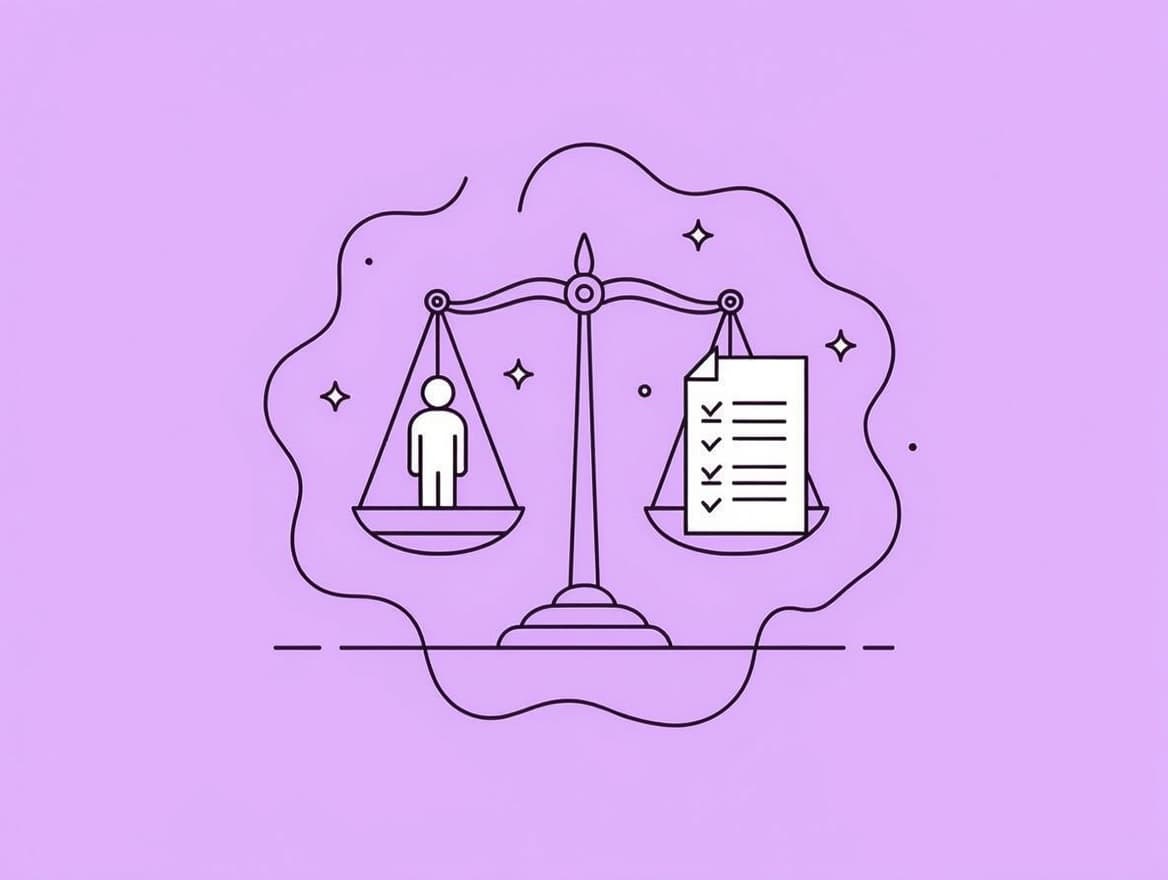Master RBT Ethics Code 2.0: Exam Scenarios & Tips

The RBT ethics code 2.0 isn't some dusty rulebook—it's your go-to guide for handling real challenges in ABA work, from client sessions to tricky parent chats. On the RBT exam, these questions pop up everywhere, testing how you'd spot a boundary issue or document a tough moment. In this post, we'll break it down simply: a fast overview, a handy decision tree for daily use, and 35 spot-on RBT ethics scenarios with answers and quick explanations. You'll walk away ready to ace the test and shine on the job, knowing exactly why each choice counts.
What Is The RBT Ethics Code 2.0?
This code lays out the basics for RBTs like you—how to act, talk to teams, keep records straight, and stay under solid supervision. It breaks into three main buckets: your overall duties, delivering hands-on behavior tech services, and what you owe the BACB plus your required supervisor. The 2.0 version took effect on January 1, 2022, and remains the current version as of 2024, with no newer public release. Check out the full details in the official RBT Ethics Code (2.0) from the BACB.
Since RBTs aren't solo pros, everything runs through qualified oversight. If problems crop up, there's a clear process for handling them. For a look at how investigations and results play out, see the BACB Code-Enforcement Procedures.
Core Principles You’ll See On The Exam
Exam ethics questions usually tie back to a handful of big ideas that keep things ethical and client-focused.
- Benefit others: Put the client's well-being, respect, and agreement first, always sticking to the behavior plan.
- Integrity: Stay truthful and on-point with your notes and team talks—no shortcuts.
- Competence: Stick to what you've been trained on; flag anything outside your wheelhouse for help.
- Client rights: Guard privacy like it's gold, get the right okay before sharing info, and follow laws like HIPAA.
That last one—HIPAA—covers privacy rules for protected health info, like what you can share and how to lock it down. As an RBT jotting notes or pulling files, you have to follow your clinic's HIPAA setup to keep client details safe. Dive into the basics with the HHS HIPAA Privacy Rule general overview.
Quick exam hack: Lots of traps hinge on "nice" vs. "right." If something sweet—like taking a thank-you gift—messes with professional lines or client protections, the smart pick is always the rule-follower.
In practice, you'll find these principles pop up in everyday spots, like turning down a family invite without awkwardness. It's not always black-and-white. But leaning on them builds trust fast.
Boundaries And Dual Relationships: Scenario Practice (1–10)
We've got 10 starters here on keeping lines clear with families and teams, drawing from BACB ethics guidelines. Pick the top choice from four options, then see the reasoning.
- A parent hands you a $20 coffee card after a rough session week.
- A. Take it—little stuff under $25 is no big deal
- B. Say thanks but no thanks, then loop in your supervisor
- C. Grab it and log it on your time sheet
- D. Only if your BCBA takes one too
The best choice is B. According to the RBT ethics code 2.0, section 2.04, gifts—even small ones—can cloud your judgment or set up ongoing asks. Politely pass and tell your supervisor, matching the code and your agency's rules.
- A caregiver hits you with a Facebook friend request.
- A. Add them to strengthen the bond
- B. Pretend you didn't see it
- C. Turn it down and chat about why pros keep distance
- D. Accept but hide their updates
Correct answer: C. Dual ties like this blur work and personal life, as outlined in BACB RBT Ethics Code section 2.05. A quick, kind heads-up keeps things pro.
- The client's sibling wants you watching them on off-days.
- A. Jump in for the side cash
- B. Bow out and flag it to your supervisor
- C. Sure, as long as it's not during hours
- D. Get parent sign-off in writing first
Go with B. Mixing job and outside gigs with client families risks conflicts—steer clear to maintain professional boundaries.
- A teacher nudges you to slip in phonics lessons during ABA slots.
- A. Cool, do it in breaks
- B. Nice try, but stick to the plan and check with your supervisor
- C. Only if you're tracking data on it
- D. Go for it with parent okay
Option B is right. Your role is the behavior plan—no freelancing. Run ideas by your supervisor to weave in school goals right.
- A parent opens up about money woes and how services might break the bank.
- A. Cut your own rate to ease it
- B. Listen in-session, stay supportive within bounds, and tip off your supervisor
- C. Swap numbers for off-hours pep talks
- D. Rally staff for a group fundraiser
Choose B. Empathy's key, but boundaries matter—let your supervisor link them to real help like billing support.
- A caregiver asks you to swing by the client's birthday bash.
- A. Pop in quick for good vibes
- B. Skip it, explain the pro line, and get supervisor input
- C. Go but dodge the camera
- D. Only with other team folks there
The correct pick is B. Party invites can muddy roles fast. Agency rules usually say pass; run it by your supervisor.
- The client's grandparent slips you cash tips for good sessions.
- A. Take it this once to be polite
- B. Always decline nicely and jot it down
- C. Accept then give to a cause
- D. Okay after a supervisor chat
Select B. Money crosses lines every time, per the ethics code. Say no, note it, and keep your supervisor in the loop.
- A parent texts post-hours about a sudden behavior jump.
- A. Text back with full how-to steps
- B. Nod and push it to your supervisor's channel
- C. Wait for next session
- D. Fire over a video link
Best is B. Stick to official paths and your supervised role—don't go rogue.
- A caregiver fishes for tips from another family's "wins."
- A. Spill general, no-names stuff
- B. No go—stress why privacy rules
- C. Share with tweaks to details
- D. Only with that parent's nod
Answer: B. Client stories stay locked. Point them to your supervisor for custom advice.
- The client makes you a cute bracelet during play.
- A. Take it so feelings stay intact
- B. Gently pass and suggest room display
- C. Okay if parents greenlight
- D. Hold it but skip wearing
Go for B. Even sweet tokens can spark repeats. Redirect to group spots that honor the effort without blurring lines.
These boundary plays? They're huge for trust. I've seen new RBTs trip here early on. But practicing spots the patterns quick.
Supervision, Scope Of Practice, And Competence: Scenario Practice (11–19)
RBTs need steady oversight to grow and stay safe. The BACB requires at least 5% of your monthly hours in supervision, with a minimum of two contacts and service observation included, as detailed in the BACB Registered Behavior Technician Handbook (2025). These RBT supervision requirements ensure competence in ABA ethics scenarios.
- Your BCBA's away two weeks, and a BCaBA steps up to cover.
- A. Nope—BCBAs only
- B. Yes, if they're your approved RBT overseer
- C. Just for data chats, skip watches
- D. Hold off till BCBA's back
The right choice is B. BCaBAs count as supervisors if they hit BACB quals and your org signs off.
- They want you starting a fresh chaining setup.
- A. Dive right in for progress
- B. Hold up—get training, a demo, and feedback first
- C. Wing it and tweak later
- D. Never touch new stuff
Correct: B. Build skills solid before rollout; supervision's there for that.
- Your monthly check-in clocks just 15 minutes.
- A. Fine—it's about depth, not time
- B. Push for more to hit 5% and include a watch
- C. Spread it over months
- D. Bill the short one as longer
Option B. Rules demand the full percentage, contacts, and eyes-on time—speak up.
- Parent pushes to tweak the reinforcement pace—it's dragging.
- A. Shift it quick to keep them happy
- B. Lay out your role and run it by your supervisor
- C. Test one round
- D. Remind them it's not up to them
Choose B. Changes need data and approval—don't solo it.
- Supervisor has you grabbing IOA data with a fellow RBT.
- A. Pass— that's BCBA work
- B. Sure, if trained; it boosts data reliability
- C. Only if it bills extra
- D. Parent okay first
B is correct. IOA's fair game for RBTs under direction and prep.
- Solo home run of a full functional analysis?
- A. Go if gear's ready
- B. Hard no—needs tight BCBA watch and advanced training
- C. Short version on video
- D. Swap for basic ABC logs
The best answer is B. High-stakes stuff like FAs demand pro-level oversight for safety.
- A task analysis step bugs the client hard.
- A. Drop it to roll on
- B. Stick to script, log it, and flag to supervisor
- C. Merge to speed up
- D. Poll the parent on cuts
Select B. Follow the plan, track reactions, and loop in—data drives tweaks.
- BCBA taps you to demo token training for a new caregiver.
- A. Out of bounds for RBTs
- B. With an approved outline and model from BCBA
- C. Your way, your style
- D. Email an ABA overview
Right choice: B. You can help train under guidance, using vetted tools.
- New client with big aggression risks, but your safety prep's thin.
- A. Ease in and pick up tips live
- B. Demand safety training now or switch cases
- C. Team up with another RBT always
- D. Let parent handle holds
Go with B. Competence first—no jumping into danger without backup skills.
Staying in your lane keeps everyone safer. If something feels off, that gut check? It's your best tool—chat it out early.
Documentation, Confidentiality, And HIPAA: Do/Don’t + Scenarios (20–27)
Notes need to be spot-on, fresh, and just what's needed for protected health info. HIPAA greenlights sharing for care, billing, or ops, but clients get access and fix rights too. More on that in the HHS HIPAA Privacy Rule overview.
Do:
- Stick to facts and behaviors linked to the plan.
- Code clients per policy; lock down gadgets and logins.
- Share info only through secure, okayed routes.
- Flag privacy slips to your supervisor right away.
Don’t:
- Stash videos on your phone.
- Text or email PHI raw or to side accounts.
- Toss in chit-chat, labels, or off-script tips.
- Fake dates, guess results, or copy without checks.
For note templates that dodge billing headaches, check the Insurance-Ready ABA Session Notes: Stop 40% of Claim Denials [2025 Guide]. Deeper HIPAA tips? See HIPAA Compliance ABA Documentation: Your $9.77M Protection Guide.
- Yesterday's note slipped your mind.
- A. Date it back
- B. Finish today with true timestamp
- C. Ditch it—too late
- D. Have a buddy file it
The correct choice is B. Truth in timing beats faking; own the delay.
- Parent wants your raw notes copied over.
- A. No—staff eyes only
- B. Point to the official request route
- C. Snap and email from phone
- D. Hand-print your draft
Answer: B. Access goes through proper HIPAA channels at your spot.
- You vid a session on your cell for later review.
- A. Fine, erase after
- B. With parent say-so
- C. Nope—org devices and storage only
- D. If BCBA said
Best is C. PHI stays in approved, safe zones—phones are out.
- Supervisor needs insurance summary.
- A. Pad with hoped-for wins
- B. Stick to what you saw and data shows
- C. Highlight hurdles for more time
- D. Let parent pick highlights
Choose B. Honesty rules—no hype or downplay.
- Oops—wrong teacher CC'd on an email with name and goals.
- A. Pull back and forget
- B. Tell supervisor ASAP and kick off breach steps
- C. Beg delete and hush
- D. Call parent to fix
The right answer is B. Potential leaks need fast reports; team handles the rest.
- Parent wants daily texts with pics.
- A. Send photos straight
- B. Pics only nameless
- C. Stick to the secure app or site
- D. Personal email it
Select C. Approved tools keep PHI locked.
- Plan's discrete trials, but you dig naturalistic more.
- A. Log what you did, skip BCBA tell
- B. Do DTT per plan; share data-backed swap ideas
- C. Flip to play style
- D. Half-and-half, no note
Correct: B. Plan first, then suggest with proof.
- Fellow RBT tips "cleaner" notes by axing tough behaviors.
- A. Copy their trick
- B. Flag to supervisor; keep your logs real
- C. Polish for parent views only
- D. Ask parent for posi-vibe prefs
Go with B. Full truth is non-negotiable—fakes flag ethics red.
Documentation's your shield in behavioral health—mess it up, and claims or complaints follow. Keep it simple and true.
Reporting Requirements To The BACB And Employers: Timelines, What To Report + Scenarios (28–35)
You have to flag certain BACB-reportable stuff within 30 days of knowing—like probes, legal hits, or conduct flags, per the BACB self-reporting guidance. Jump on it early, with docs and follows as needed. For supervisor duties, see the Ethics Code for Behavior Analysts (BACB).
- State agency probes you on non-work stuff.
- A. Sit tight for results
- B. BACB self-report in 30 days; boss too per rules
- C. Only if guilty
- D. Let HR handle
The best choice is B. Timelines are strict—get ahead and keep your supervisor posted.
- Misdemeanor arrest, but no charges stick.
- A. Nothing to see
- B. Check BACB list; report in 30 if fits, plus employer chat
- C. Felonies only
- D. Save for renewal
Answer: B. Review what counts; err on caution with your supervisor.
- Legal name switch.
- A. Renewal time
- B. Update BACB account now
- C. Skip it
- D. Employer only
Correct: B. Keep cert records current across the board.
- You spot another RBT faking notes.
- A. Call them out, done
- B. Route to supervisor or chain; help if asked
- C. Anon social post
- D. Look away
Choose B. Internal paths protect integrity—don't go lone wolf.
- You restraint-ed outside the plan by accident.
- A. Omit from note
- B. Log true, alert supervisor now, hit incident protocol
- C. Wait for harm signs
- D. Explain to parent as must-do
Right answer: B. Incidents demand instant flags and facts.
- This month's supervision dipped under 5%.
- A. Boost next to balance
- B. Tell supervisor; fix in-month if you can, log fixes
- C. One-off ignore
- D. Pad with extras
Select B. Monthly mins are real—own and remedy.
- Cease-and-desist hits on side biz with your name.
- A. Not ABA, so nah
- B. Check policy; see if BACB report fits, act in 30
- C. Client tie only
- D. Coworker advice
The correct choice is B. Some legal stuff qualifies—vet it quick.
- Supervisor wants your sig on backdated hours.
- A. Sign for team good
- B. Refuse; flag the ask right, hold records honest
- C. If nearly there
- D. Buddy sign
Go with B. Falsifying's a no—use proper channels.
Reporting feels heavy, but it's what keeps our field clean. Early action saves headaches down the line.
Quick-Reference Decision Tree For Common Ethical Dilemmas
When a dilemma hits, run this tree—it's saved me in sticky spots.
-
- Safety risk right now?
- Yes: Hit the safety plan, yell for supervisor.
- No: Step 2.
-
- Fits your role and skills?
- No: Freeze, call supervisor.
- Yes: Step 3.
-
- Plan backs this move?
- No: Stop, supervisor consult.
- Yes: Step 4.
-
- Hits rights, privacy, or lines?
- Yes: Pick safest, least-share option; secure channels; note it.
- No: Roll per plan.
-
- Code or policy says report/doc?
- Yes: Fact-based log, hit timelines.
- No: Standard note, keep watch.
Stuck? Pause, jot objective facts, supervisor stat.
Study Downloads And RBT Ethics Checklist
Print this checklist for exam crunches or job audits—it's a game-changer for RBT ethics scenarios.
- Check supervision monthly: 5% min, 2+ contacts, 1+ observation.
- Hold boundaries: Skip gifts, social adds, family side jobs.
- Lock privacy: Approved apps only, no phone PHI, bare essentials.
- Note real: No dates fudged, no assumes, no fluff.
- Flag fast: Safety, abuse hints, fakes, leaks.
- BACB self-report in 30 days if needed; employer rules too.
- Scope tight: Train up new, get demos and input.
For more drills and packs, try the RBT Exam Study Guide 2025: Complete Prep with Practice Questions & Tips or ABA Principles and Techniques Every RBT Must Know [2025].
Exam Tips And Common Traps
- Spot role limits: Plan shifts or big calls? Supervisor's job.
- Safety and rules win: "Kind" options that bend policy? Pick rules.
- Note then flag: Facts + quick reports crush quiet.
- HIPAA gotchas: Phones, raw texts, "quick" emails—traps everywhere.
- No supervision averaging: Monthly hits monthly; fix live.
- Gifts, events, favors? Boundaries 99% of the time.
To boost your prep for the RBT exam, here are two sample multiple-choice questions in the actual format, focused on the RBT ethics code 2.0:
Sample Question 1: An RBT receives a small gift from a client's parent. What should the RBT do according to the BACB RBT Ethics Code?
- A. Accept it if it's under $25
- B. Decline the gift and inform the supervisor
- C. Accept it and donate it later
- D. Only accept if the supervisor approves first Correct: B
Sample Question 2: During a session, a client exhibits unsafe behavior not covered in the plan. The RBT's first action is:
- A. Implement a new intervention
- B. Immediately contact the supervisor
- C. Continue the session as planned
- D. Document after the session Correct: B
These traps? They're sneaky, but spotting them turns ethics from stress to strength.
Frequently Asked Questions
How many RBT exam questions focus on ethics?
The BACB keeps exact breakdowns under wraps, but ethics threads through key areas like notes, boundaries, oversight, and pro conduct. Count on multiple RBT ethics scenarios hitting supervision, privacy, and reports. Lean on RBT ethics code 2.0 wording to pick and ditch rule-breakers.
What’s the difference between the RBT Ethics Code and the Behavior Analyst Ethics Code?
Your BACB RBT Ethics Code zeros in on tech-level tasks under guidance. BCBAs and BCaBAs use the full Ethics Code for Behavior Analysts, covering evals, plans, oversight, and org stuff. As RBT, hand off clinical calls to your supervisor.
What is the current RBT supervision requirement?
At least 5% of monthly service hours, with two contacts per month and observation included. Supervisors need BACB creds and training. Full scoop in the 2025 BACB RBT Handbook.
When must an RBT self-report to the BACB?
Within 30 days of spotting a trigger event, like certain probes or legal moves, per BACB self-reporting guidance. Act fast, no outcome wait. Update employer and follow up as needed.
Can I accept small gifts or connect with families on social media?
Nope—both spark dual relationships and objectivity slips, as prohibited in the RBT ethics code 2.0 sections 2.04 (gifts) and 2.05 (dual relationships). Kindly decline, explain pro boundaries. Supervisor or agency policy if gray.
Can I record sessions on my phone if the parent consents?
Stick to org-approved gear and secure spots. Consent doesn't override rules—personal devices usually nix PHI under HIPAA and employer setups.
Ethical work's a habit you build daily, not cram once. The RBT ethics code 2.0 hands you the map: safeguard rights, scope smart, note true, supervisor early. Next? Pin the BACB code, monthly supervision alerts, 5-10 scenario runs with this tree. For deeper practice, hit these 35 then grab full sets from the RBT exam guide.
Popular in Study Guides & Exam Prep
- 1
2025 RBT Competency Assessment Preparation Checklist
3,92810 min read - 2
BCBA Ethical Decision-Making Model: 8-Step Exam Guide
1,2048 min read - 3
RBT Task List A-01: Prepare for Data Collection — 7-Step Checklist
1,1946 min read - 4
Essential BCBA Supervision Contract Requirements
1,1839 min read - 5
RBT Exam Study Guide 2025: Complete Prep with Practice Questions & Tips
1,0858 min read
Popular in Study Guides & Exam Prep
- 1
2025 RBT Competency Assessment Preparation Checklist
3,92810 min read - 2
BCBA Ethical Decision-Making Model: 8-Step Exam Guide
1,2048 min read - 3
RBT Task List A-01: Prepare for Data Collection — 7-Step Checklist
1,1946 min read - 4
Essential BCBA Supervision Contract Requirements
1,1839 min read - 5
RBT Exam Study Guide 2025: Complete Prep with Practice Questions & Tips
1,0858 min read
Related Resources
Explore more helpful content on similar topics

2025 RBT Competency Assessment Preparation Checklist
Prepare for the 2025 RBT competency assessment with our comprehensive checklist. Discover key domains like measurement, skill acquisition, and professionalism, plus BACB compliance tips and documentation best practices to ace your certification.

RBT Task List F-03: Master Communication & Ethics
Master RBT Task List F-03: Expert tips on stakeholder communication and confidentiality ethics per BACB code. Practice questions, pitfalls to avoid, and strategies to ace your RBT exam!

RBT Task List F-01: Exam Prep Mastery
Master RBT Task List F-01: Expert guide to service delivery, supervision, ethics, and exam scenarios. Practice with questions and mini-assessments to pass your RBT certification!